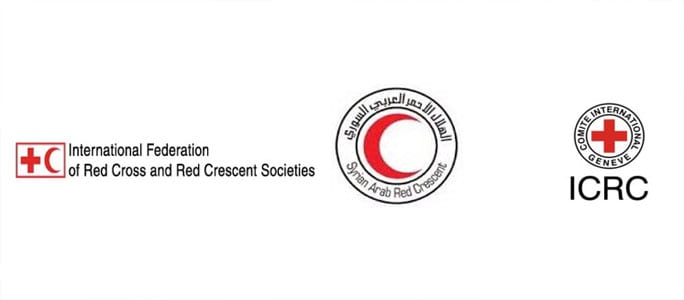14 March 2014, Damascus/Geneva (SARC/IFRC/ICRC)
In the three years since the beginning of the crisis in Syria, the situation has developed into a humanitarian disaster of appalling dimensions. More than 9 million Syrians are in need of urgent assistance, including 6.5 million people displaced inside their own country, half of them children, struggling to survive amid the fighting. A further 2.4 million people have fled Syria since January 2012, seeking refuge in Lebanon, Jordan, Turkey, Iraq and Egypt. Thousands more families have left for countries further afield. Today, the humanitarian situation continues to deteriorate rapidly in large parts of the country.
Three years on, this conflict has pushed the coping mechanisms of millions of families to the edge and compromised the capacity of Syrians, and the country as a whole, to recover from enduring violence and absolute destruction. A growing number of Syrians struggle every day to meet their basic needs. Many, in large areas of the country, are starving. Today, the people of Syria can barely recognize their once thriving communities, their once prospering nation.
From the onset of the crisis, the Syrian Arab Red Crescent (SARC) has been the primary provider of humanitarian services, reaching above 3 million each month.
“In 2010, our focus was to assist over 140,000 Iraqis who had sought refuge in Syria, to prepare for natural disasters and to assist other National Societies during crises,” says SARC President Dr. Abdulrahman Attar. “Three years later, together with our International Red Cross and Red Crescent Movement partners, we are providing impartial relief to millions of Syrians affected by the conflict.”
“The transition from a National Society operating in times of peace to a lead agency coordinating Movement and overall humanitarian efforts in the midst of an armed conflict that affects millions was a tremendous challenge for us,” says Dr. Attar. “First and foremost, it is the commitment of our volunteers to the Red Cross and Red Crescent Fundamental Principles of neutrality, impartiality and independence, and their fearlessness in the face of great danger that makes our role and response possible.”
According to UN estimates, around 3 million civilians are still trapped today in areas surrounded by on-going violence, and with no or limited and irregular access to humanitarian assistance. While the entire country has been affected by the conflict, the situation is particularly alarming in the suburbs of Damascus, the governorates of Rural Damascus, Aleppo, Homs, Dara’a, Idleb, Hama, Deir Ezzor, Raqqa as well as in Hassakeh governorate.
Since January 2014, SARC teams have delivered much-needed humanitarian aid and services in all 14 Syrian governorates, where the population lives under extreme duress. In Deir Ezzor, SARC teams delivered essential relief after four months of blockages and continuous fighting.
34 SARC staff and volunteers have been killed while carrying out their humanitarian mission since the beginning of the conflict and many have been wounded. “This is an unacceptable toll for their families and for the organization,” says Dr. Attar. “Much more must be done by all parties to the conflict to respect the red crescent and red cross emblems and to ensure that those who strive to save lives do not themselves become victims.”
In countries neighbouring Syria, the suffering of people continues with around 2.4 million refugees lacking all kinds of basic needs. Host communities are also facing immense pressure. The strain on local livelihoods, infrastructure and resources in these countries is not sustainable as competition for resources such as access to health care, schools and essential supplies continue to increase. The lack of sustainable livelihoods and tensions between communities represent some of the main risks for both Syrian refugees and overextended host families.
As the world marks the third year since the start of the conflict, the International Red Cross and Red Crescent Movement reiterates its call to the parties to the conflict to observe their responsibilities under International Humanitarian Law. The Movement is committed to doing more to ease the suffering of the millions of Syrians affected by the conflict, but can only do so if the parties to the conflict ensure at all times the rapid, safe and unimpeded passage of impartial humanitarian relief.
For further information, please contact:
In Damascus:
- Vivian Tou’meh, Communications Coordinator, Syrian Arab Red Crescent
Mobile: +963 113 327 645/46 Email: vivianto3@gmail.com
- Simon Schorno, Head of Communications, International Committee of the Red Cross in Syria
Mobile: +963 993 700 847 Email: sschorno@icrc.org
In Beirut:
- Raefah Makki, Senior Communications Officer, International Federation of Red Cross and Red Crescent Societies, MENA Zone, Beirut
Mobile: +961 70 258225 Email: raefah.makki@ifrc.org
In Geneva:
- Ewan Watson, Public Relations Officer, International Committee of the Red Cross, Geneva
Mobile: +41 79 244 64 70 Email: ewatson@icrc.org - Reeni Amin Chua, Communication Officer, International Federation of Red Cross and Red Crescent Societies, Geneva
Mobile: +41 79 708 62 73 Email: reeni.aminchua@ifrc.org

